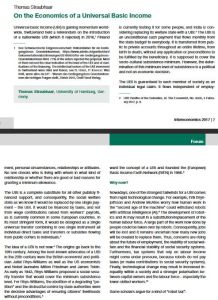Join getAbstract to access the summary!

Join getAbstract to access the summary!
Thomas Straubhaar
On the Economics of a Universal Basic Income
CEPS, 2017
What's inside?
Though a relatively radical concept, universal basic income is gaining attention and support.
Recommendation
As automation and technology raise concerns about job losses, some economists and governments have floated the idea of a universal basic income (UBI) as a mechanism for ensuring citizens a minimal level of financial support. Under a UBI system, everyone receives unconditional lifetime cash payments that substitute for other forms of public aid. One of the best features of a UBI, according to Professor Thomas Straubhaar in his clearly argued essay, is its blindness to economic circumstance and judgment. getAbstract recommends his enlightening, albeit somewhat overly sanguine, report to those interested in the nexus between economics and social policy.
Summary
About the Author
Thomas Straubhaar is a professor of economics at the University of Hamburg, Germany.
















Comment on this summary